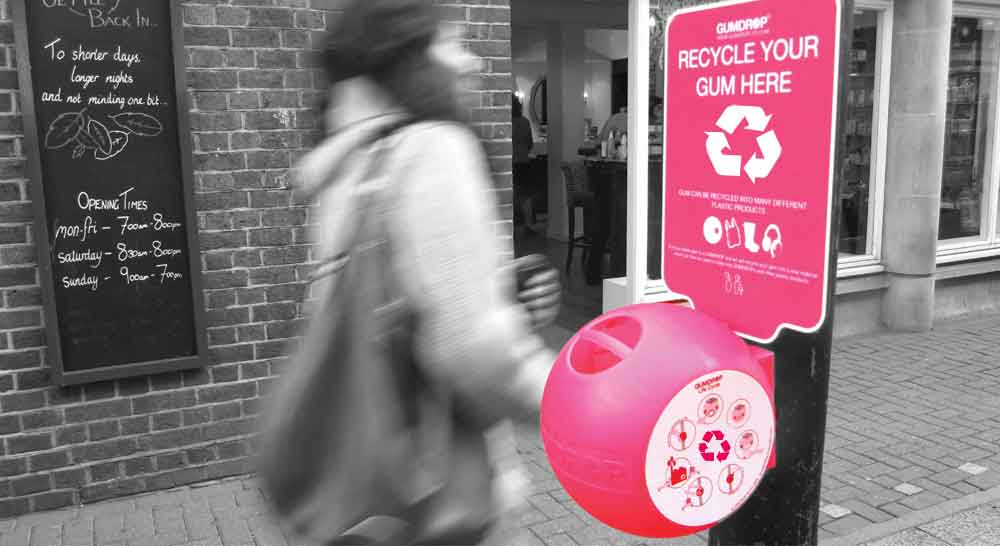In April, the Local Government Association (LGA) declared war on chewing gum:
“Chewing gum is a plague on our pavements. It’s ugly, it’s unsightly and it’s unacceptable.”
Representing more than 370 councils in England and Wales, the LGA called on chewing gum manufacturers for more support in tackling the £60m annual cost of removing discarded gum:
“Chewing gum manufacturers must help more with the growing multi-million pound cost to local communities of removing discarded gum, with 99% of the nation’s main shopping streets now spattered.”
A growing market, a costly problem
Chewing gum may be a modern-day product, but its origins go back a long way. The ancient Greeks, Aztecs, Mayans and Chinese all chewed substances made from the extract of plants and trees. But it was the commercial development of chewing gum in the United States in the 1860s that launched an international market that has continued to grow.
Today, sugar-free gum is marketed as a healthy alternative to confectionery and tobacco, with claims of added benefits, such as fresher breath and whiter teeth. Research in 2015 forecast a 32.6% rise in global chewing gum sales to reach $32.63 billion by 2019. Britain’s chewing gum market is seventh in the world.
All of which means that as more gum is being consumed, more is being discarded on city streets. Research by Keep Britain Tidy has found that 99% of main shopping streets and 64% of all roads and pavements are stained by chewing gum. And once a piece of gum hits the ground, it’s likely to remain there. Gum is made from synthetic plastics that don’t biodegrade, so it can only be addressed by costly removal techniques, such as steam cleaning.
As the LGA has pointed out, councils have no legal obligation to clear up gum once it has been flattened onto the ground. Even so, many councils have mounted gum cleaning operations to make the streets more attractive and improve the environment for residents, visitors and businesses. But local authorities find themselves under increasing budgetary pressures, and are keen to find alternative solutions.
Taking action
Established in 2009, Gumdrop Ltd is the first company in the world to recycle and process chewing gum into a range of new compounds that can be used in the rubber and plastics industry.
Its eye-catching receptacles (also called Gumdrops), are made from recycled chewing gum, and placed in public places for the collection of gum that would otherwise litter the streets. Once full, Gumdrops and their contents are recycled and processed to make new Gumdrops.

Image: Gumdrop Ltd
The company has been working with public and private organisations to install their receptacles in railway stations, shopping centres, airports and universities, and has also formed links with chewing gum manufacturers. In partnership with Cardiff Council and Keep Wales Tidy, Gumdrop joined forces with The Wrigley Company Ltd. in 2013 to locate bins across the city centre and key district shopping centres. Siân O’Keefe, Senior Manager, Corporate Affairs at Wrigley, believes the project is a good model for others to follow.
“Encouraging behaviour change is the only long-term and sustainable solution to the problem of littered gum and we are totally committed tackling this issue”.
Another initiative aiming to promote a gum-free environment is Keep Britain Tidy’s Chewing Gum Action Group. This campaign unites local authorities, central government and the chewing gum industry to encourage responsible disposal of gum. The group’s annual promotion encourages councils to run corresponding local campaigns across the UK. In 2016, the 11 local campaigns saw a 36% average reduction of dropped gum in monitored areas.
Meanwhile, one inventive individual in London is making a virtue of an eyesore by creating miniature works of art, with chewing gum as his canvas.
Final thoughts
Chewing gum waste is not just a problem in the UK. Across the world, authorities are looking at different approaches to deal with it. As of yet, there’s no sign of the UK following the lead of Singapore in banning the sale of chewing gum. Instead, national and local governments are trying to find less authoritarian ways of tackling this modern-day blight.
The progress made by Keep Britain Tidy, Gumdrop and others in the public and private sectors is to be applauded. But, as the LGA has made clear, gum manufacturers are now being expected to do a lot more, both by switching to biodegradable gum and contributing to the cost of clearing it up.
“While awareness campaigns the industry is involved in have some value, they are not enough by themselves. The industry needs to go a lot further, faster, in tackling this issue.”
If you enjoyed this article, you may also find our other blogs on waste management of interest:
Share
Related Posts
Supporting residents on the decarbonisation journey: leveraging data for effective retrofit projects
As the drive towards decarbonisation intensifies, the social housing sector’s ability to collect, store and manage vast amounts of data becomes increasingly critical. With a shared goal of creating warmer, carbon-free homes, housing associations’ strategic use of data is essential ....
The recent spikes in energy costs have thrown into sharp focus the challenge of heating our homes. Domestic heating is important, not just for our comfort and wellbeing, but to reduce humidity and prevent condensation. But because traditional heating systems ....
By Ian Babelon A new-old concept for proximity “Are we there yet?” Parents may patiently nod to their children’s insistent nudges on a 20-minute journey to… somewhere. Quite rightly, researchers have asked: twenty minutes to what? The answer may well ....
By Sarah Perry At the end of June, GrantFinder attended The Chartered Institute of Housing’s annual conference, Europe’s largest housing festival. The event took centre stage at Manchester Central, bringing together industry experts, policymakers, and housing practitioners from across the ....

